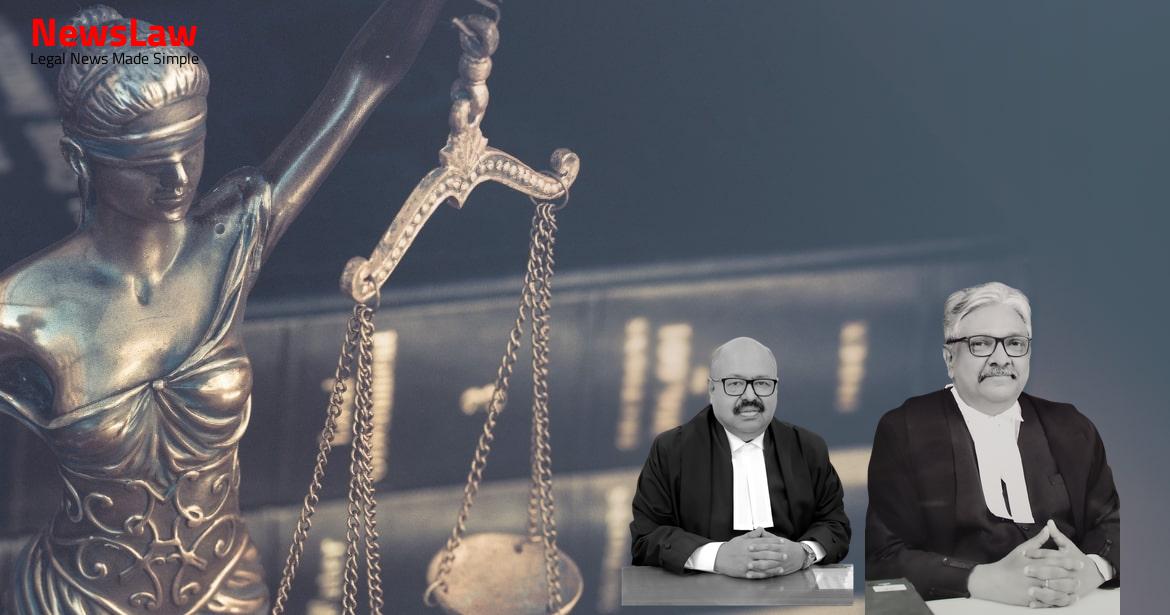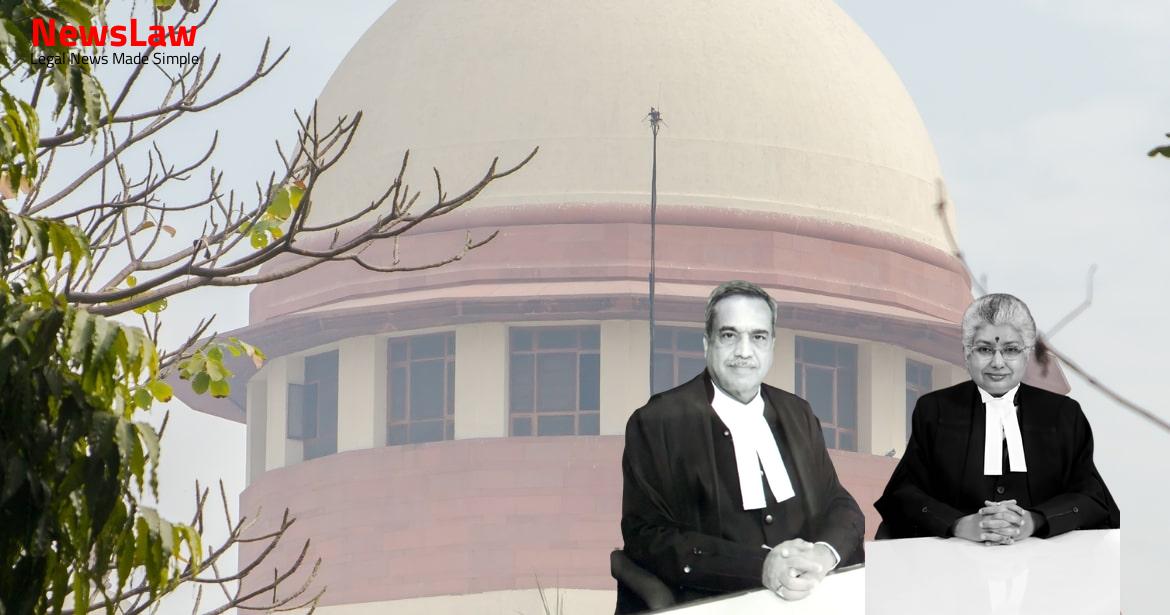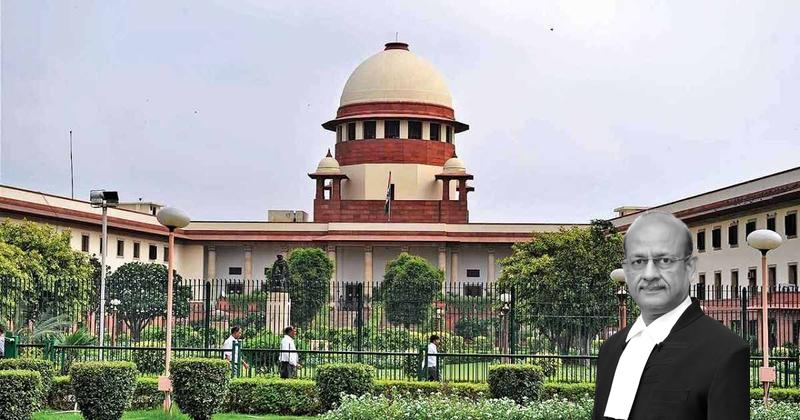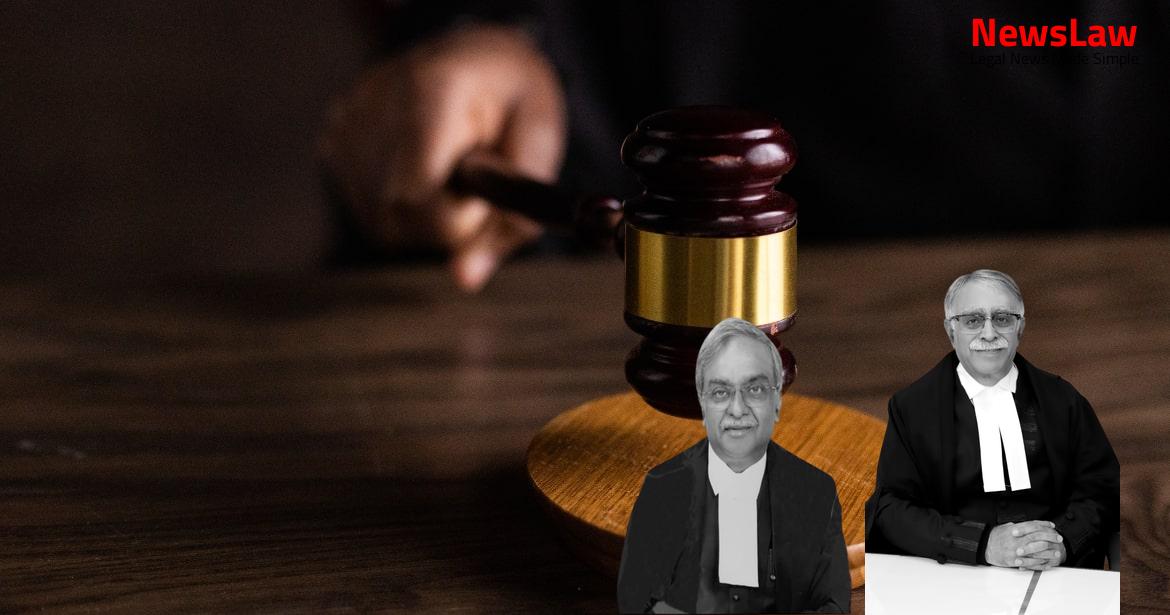Delve into the complexities of burden of proof in cases of dishonor of cheques as the court meticulously analyzes the defense presented by the accused. The court’s evaluation of the legal aspects provides valuable insights into the nuances of the law in such matters, highlighting the importance of establishing a probable defense to rebut legal presumptions.
Facts
- Respondent alleged appellant needed money in August 2011 and gave him Rs.7 Lakhs out of friendship.
- Appellant’s cheque given in return was dishonored.
- During trial, appellant examined DW-1 to DW-4.
- Appellant challenges High Court’s judgment dismissing Criminal Revision No.129 of 2018.
- High Court upheld CJM’s decision finding appellant guilty under Section 138 of the NI Act.
- The appellant has been sentenced to one year of simple imprisonment.
- The key issue in this part of the judgment is the length and nature of the appellant’s sentence.
- The appellant is required to serve his sentence in accordance with the court’s order.
- The court has ordered the appellant to undergo simple imprisonment for the specified period.
Also Read: Legal Analysis of Assignment and Ratification in Property Law
Arguments
- Ms. Sangeeta Bharti, the counsel for the appellant, raised arguments regarding the financial capacity of the complainant to give a loan of Rs.7 Lakhs.
- Doubts were raised concerning the purpose of examining certain witnesses as highlighted by the High Court.
- The appellant’s defense was based on the alleged loss of a signed cheque and cheque book while being carried by DW-5, without any complaints lodged to the Bank or the Police.
- The reply notice sent by the appellant indicated a friendly relationship with the respondent, raising questions about the nature of the loan given.
- No challenge was made regarding the authenticity of the signature on the cheque, strengthening the complainant’s position of providing a hand loan.
- The absence of evidence from the bank official about the notice given regarding the lost cheque was noted by the Courts.
- Mr. Ajay Marwah, the counsel for the respondent, highlighted the version presented by the appellant through DW-5 and the admission of a reply notice by the complainant.
- The complainant stated that the transaction took place on August 5, 2011, and the money was demanded in the first week of August on the same date.
- The appellant argues that the court’s finding supports the contention that the High Court and lower courts did not appreciate the law regarding the effect of a ‘probable defence’.
- Reference was made to the judgment in Basalingapa Vs. Mudibasappa (2019) 5 SCC 418 by the appellant.
- The appellant points out that three courts have ruled against them, and there is no ground for interference.
Also Read: Second Appeal Jurisdiction in Punjab and Haryana
Analysis
- The accused, in a case under Section 138 of the Negotiable Instruments Act, has the burden to raise a probable defense to rebut the presumption.
- The accused can rely on evidence led by him or materials submitted by the complainant to establish a probable defense.
- The accused must show that the complainant’s case is in peril by establishing a probable defense.
- The onus is on the accused to raise a probable defense to rebut the presumption under Section 139 of the Act.
- The accused is not expected to discharge an unduly high standard of proof but needs to present a probable defense.
- The accused has the right to demonstrate that the complainant did not have the financial capacity to give the loan by producing independent materials.
- The Courts must carefully consider the totality of evidence to determine if a probable defense has been established by the accused.
- Section 139 of the N.I. Act states that the Court shall presume that the holder of a cheque received it for the discharge of a debt or liability.
- This presumption applies whether the cheque was received in whole or in part for the payment of the debt.
- The burden of proof shifts to the accused to rebut this presumption in a case involving dishonor of the cheque under Section 138.
- Article 136 jurisdiction in appeals is rare and extraordinary
- Special leave is granted in rare and extraordinary cases
- Not every case of three Courts falling into error warrants interference by the Supreme Court
- In this case, appellant failed to establish a case for interference with the lower Courts’ finding of Section 138 N.I. Act offence
- Rs.7 Lakhs compensation related to the cheque amount has been deposited in Trial Court
- Even under Article 136, the Supreme Court may intervene if three Courts have erred egregiously
Also Read: Analysis of Rule 54 in Disciplinary Proceedings
Decision
- The appellant must deposit a sum of Rs.15,000/- as further compensation for the respondent.
- The appellant is sentenced to a fine of Rs.5,000/- to be deposited within one month in the Trial Court.
- The sentence of one year imprisonment is vacated, and the appellant shall not serve time in jail.
- In case of default in payment, the appellant will undergo one month of simple imprisonment.
- The fine of Rs.5,000/- is considered as a substitution for the one year imprisonment.
- Additionally, a further amount of Rs.15,000/- is to be paid as compensation to the respondent.
- Both amounts must be deposited in the Trial Court within four weeks from today.
Case Title: TEDHI SINGH Vs. NARAYAN DASS MAHANT (2022 INSC 272)
Case Number: Crl.A. No.-000362-000362 / 2022



